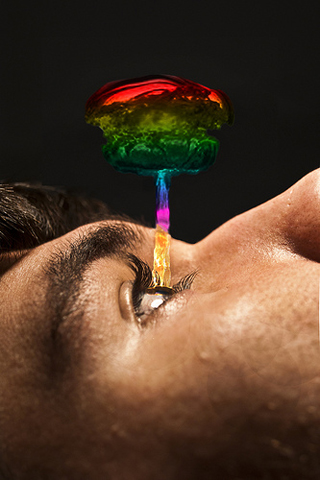I’ve endured 18 years of bad vision. I’ve worn glasses or contacts since elementary/middle school.
In prehistoric days, bad eyesight might have been a death sentence. I couldn’t hunt prey, forage for berries or spot predators. In 21st century America, though, blurry vision is a minor inconvenience. It’s also an expense that adds up faster than you might expect.
An annual eye exam and contact lens prescription costs about $300 a year (in today’s dollars). That means fixing my vision has cost $5,400 over the past two decades.
That price tag nearly doubled on Friday, when I shelled out $4,000 for LASIK eye surgery. (It blows my mind that our society is advanced enough to operate on people’s eyeballs. I mean, really?) Assuming I never spend another dime on my eyesight again, blurry vision has cost me a little less than $10,000.
Is that a little or a lot? That’s relative. Millions of people have spent a lot more dealing with near-blindness or advanced eye disease. Millions more have never spent a penny on their vision.
Health-related costs are sheer luck of the draw. Some people shoulder huge health costs; others spend next-to-nothing.
If you haven’t needed to spend much on your health, you’re fortunate. Don’t squander your healthy days with extreme coupon-clipping and penny-pinching. It’s a waste of your blessings. There are better ways to spend your life.
If you’ve spent a lot of money on your health – first, I hope for your strong recovery. Second, rest assured you’ve spent your money in the best possible way.
Nothing Else Matters
Afford Anything is devoted to ruthlessly prioritizing your expenses. Slash the unimportant costs so you can spend wildly on what matters most.
99% of the time, I have no opinion about what expenses should hit the top of your list. If you’re passionate about travel, handbags, fancy cars or baseball cards, go for it. Spend outrageously on what you love.
But there’s one expense that comes first no matter what: your health. It’s ridiculous to compromise your well-being for the sake of saving a few hundred (or even a few thousand) bucks. What else are you going to do with that money? You’re not going to enjoy travel, nice dinners or sleek cars if you’re in chronic pain.
I’m infuriated by penny-pinchers who cut corners when it comes to their well-being. People will skip a doctor’s appointment to avoid the co-pay or avoid filling a prescription to save $100. At the same time, they have cable TV service and eat at restaurants. That’s a perverse ordering of priorities.
The same is true when it comes to safety. There’s no reason to go into debt to drive a shiny new Lexus. But if your car is so old that the seatbelt fibers are fraying, get a new car (or replace the seatbelt). If your car doesn’t have airbags, buy one that does. If your tires are bald, get new tires with traction.
Screw the Veggies!
I’ve heard penny-pinchers recommend eating nothing but pasta in order to save money. Screw the vegetables, we’ll live on rice! That’s short-sighted and pound-foolish. (And it insults the ancestors who painstakingly built our advanced society).
Extreme penny-pinchers also forsake routine checkups and screenings because their bodies will “clue them in” if something’s wrong. Hogwash.
Take care of yourself, or life will catch up with you sooner than you expect. A seven-figure retirement account won’t do you any good if you’ve withered away by the time you’re 55.
“But I can heal myself with good vibes and lots of karma!” No, you can’t.
There’s no expense more worthwhile than preserving life. Get the treatment you need, even if you have to go into debt to do it. Yes, I am giving you permission to go into medical debt if necessary. It sucks, but it’s better than the alternative.
You’ll regret your bald tires when you’ve broken a few ribs. You’ll yearn for that $1,500 deductible when your condition has advanced beyond care.
And for the love of God, if you’re self-employed or if you don’t have health insurance – BUY SOME! – even if you have to wear clothes from Goodwill and skip flying home for Christmas to afford the monthly premiums. Want a defense against medical debt? It’s called insurance. It’s not 100 percent foolproof, but it’s the best chance you’ve got.
Money is unlimited – you can always make more. Health is a scarce and finite resource. Once it’s gone, it’s gone.
Thanks to Louis Rabin for the photo.

